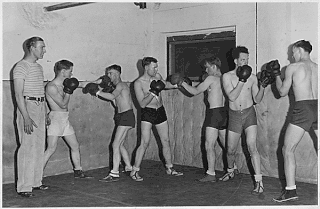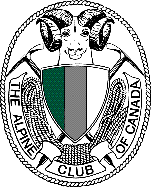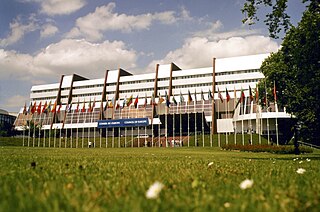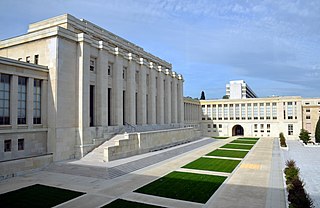Related Research Articles

YMCA, sometimes regionally called the Y, is a worldwide youth organization based in Geneva, Switzerland, with more than 64 million beneficiaries in 120 countries. It was founded on 6 June 1844 by George Williams in London, originally as the Young Men's Christian Association, and aims to put Christian values into practice by developing a healthy "body, mind, and spirit".
A student society, student association, university society, student club, university club, or student organization is a society or an organization, operated by students at a university or a college institution, whose membership typically consists only of students and/or alumni.
The United Nations Association in Canada (UNA-Canada) is an historic, national charitable organization providing the leading policy voice on multilateralism in Canada. Established in 1946, UNA-Canada was a founding member of the World Federation of United Nations Association.

Civic engagement or civic participation is any individual or group activity addressing issues of public concern. Civic engagement includes communities working together or individuals working alone in both political and non-political actions to protect public values or make a change in a community. The goal of civic engagement is to address public concerns and promote the quality of the community.

The Alpine Club of Canada (ACC) is an amateur athletic association with its national office in Canmore, Alberta that has been a focal point for Canadian mountaineering since its founding in 1906. The club was co-founded by Arthur Oliver Wheeler, who served as its first president, and Elizabeth Parker, a journalist for the Manitoba Free Press. Byron Harmon, whose 6500+ photographs of the Canadian Rockies in the early 20th century provide the best glimpse of the area at that time, was official photographer to the club at its founding. The club is the leading organization in Canada devoted to climbing, mountain culture, and issues related to alpine pursuits and ecology. It is also the Canadian regulatory organization for climbing competition, sanctioning local, regional and national events, and assembling, coaching and supporting the national team.

The Congress of Local and Regional Authorities is the pan-European political assembly representing local and regional authorities from the forty-six member states of the Council of Europe. Its role is to promote local and regional democracy, improve local and regional governance and strengthen authorities' self-government, according to the principles laid down in the European Charter of Local Self-Government. It is made up of two chambers, the Chamber of Local Authorities and the Chamber of Regions and holds its plenary sessions twice a year at the Palace of Europe in Strasbourg, where its permanent Secretariat is located.
The China Youth Development Foundation (CYDF) is a national non-profit and non-governmental organization founded in March 1989 in Beijing. The CYDF works to develop Chinese youth through education, science and technology, culture, physical education, health, and environmental protection. The CYDF is best known for launching and managing its largest program to date, "Project Hope." Project Hope has sought to help school dropouts in poor remote regions return to school and complete at least an elementary education.
Citizen Corps is a program under the Department of Homeland Security that provides training for the population of the United States to assist in the recovery after a disaster or terrorist attack. Each local Citizen Corps Council partners with organizations, volunteers and businesses to organize responders, volunteers and professional first responders for an efficient response so efforts are not wasted by being duplicated. By training in Incident Command, volunteers know whom to report to and how the incident is organized. This prevents sites from being inundated by untrained and unprepared personnel preventing operation. Citizen Corps also works in conjunction with the Corporation for National and Community Service in promoting national service opportunities for promoting homeland security needs.

The United World College Costa Rica, located in the Santa Ana suburb of San José, is the 11th college in the UWC movement and the first to offer instruction in both English and Spanish. The College, formerly the "Colegio Internacional SOS Hermann Gmeiner," re-opened as a United World College in August 2006, and graduated its first UWC-admitted applicants in 2008.
The Rural Development Foundation is an NGO established by the Primate of Poland on June 30, 1999. It came as a result of the merger between the Water Supply Foundation and the Agricultural Foundation. Over the years many different programs have developed to help the rural communities of Poland.

An international organization or international organisation, also known as an intergovernmental organization or an international institution, is a stable set of norms and rules meant to govern the behavior of states and other actors in the international system. Organizations may be established by a treaty or be an instrument governed by international law and possessing its own legal personality, such as the United Nations, the World Health Organization and NATO. International organizations are composed of primarily member states, but may also include other entities, such as other international organizations, firms, and nongovernmental organizations. Additionally, entities may hold observer status.

The Ministry of Youth and Sports of Azerbaijan Republic is a governmental agency within the Cabinet of Azerbaijan in charge of regulating activities related to sports and youth development in Azerbaijan Republic. The ministry is headed by Farid Gayibov.
Manitoba Sport, Culture and Heritage is the department of the Government of Manitoba responsible for managing government programs and services that support the sport, art, culture, and heritage of the province, through developing, supporting, promoting, and celebrating the identity and well-being of Manitoba and its communities.
Disability art or disability arts is any art, theatre, fine arts, film, writing, music or club that takes disability as its theme or whose context relates to disability.
Shooting sports in Canada are practised across the country at recreational and competitive levels, including internationally and at the Olympics. Each province has its own organizations that govern the various disciplines. Many of the disciplines are connected nationally and some are part of larger international organizations.

The CSIT – International Workers and Amateurs in Sports Confederation is an international multi-sports organization. It was established as the successor to Socialist Workers' Sport International and as such celebrated its centenary in 2013. The core principles of contributing to physical activity and sports have stayed in its action policy: it is a right of men and women to do sports no matter what are their professionalism levels. The key concept of the CSIT's sport policy has always been "Sports for all". The policy stems from the historic ideas of the international worker sport movement.
European Sports NGO Youth is the non-governmental umbrella youth organisation of ENGSO. It has the aim to represent the young Europeans in sports in 34 countries and to achieve, promote and support the implementation of the ENGSO guidelines for children and youth sport. ENGSO Youth promotes health, sustainable development, sport diplomacy, education and employability, and inclusion through sports. ENGSO Youth is member of the European Youth Forum since 2007.
Sports are activities involving physical exertion and skill, in which a team compete against another as a form of entertainment. The universality of sport allows it to encompass several different rights. Most sporting events have a huge impact on human rights. Human rights are rights that are believed to belong to justifiably every person. In particular youth sport which concerns the rights of children. The practice of sport is beneficial to children as it can have a positive impact on their physical, mental, psycho-motor and social development skills. Sport is helpful in a human rights context as it encourages the integration of children from different cultural or economic backgrounds, those with disabilities and helps promote gender equality.
The Quality of Life Program (QOLP) is one of the Saudi Vision 2030 Realization Programs. It was launched in the middle of 2018 with the strategic aim to improve ‘lifestyle’ and ‘livability’ of individuals, families and communities. This aim is achieved through transforming cities by supporting and creating more choices that foster participation in environmental, cultural, social, entertaining, sporting, and other activities. These activities aim to increase the overall wellbeing while creating additional jobs, diversifying the economy, and improving the overall status of Saudi cities to be among the world's best cities classification.
References
- ↑ "Sport diplomacy for development and peace | sportanddev.org". www.sportanddev.org. Retrieved 2022-02-28.